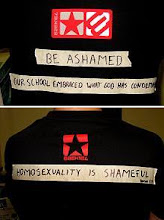When a student who disapproves of homosexuality wears a T-shirt that reads, "Be Happy, Not Gay," or "Homosexuality is Shameful", is that student a) exercising religious beliefs; b) enjoying the right to free speech; or c) infringing on the rights of others? At what point does a provocative or unpopular message become disruptive, harassing or even "hate speech"?
Schools are permitted and required to maintain order, and if there is a bona fide disruption, then schools can or should take action. Short of a disruption, can or should the school proactively take any action? What "dress code" regulations might withstand First Amendment scrutiny? Many have failed.
There is no "Hate Speech" exception to the First Amendment. But when does an unpopular message meet the narrow definition of "fighting words", the exception to the First Amendment prohibition against "content-based" or "viewpoint" discrimination?
No harassment can result if the shirt is worn in private (If a tree falls in a forest and no one is around to hear it ...). And most likely, no harassment can result if the shirt is worn in a gathering that includes only like-minded individuals. But what happens when it is worn to school and a student, staff or administrator complains?
Is it possible or even laudable to limit "life-style disapproving" speech, given that censorship of unpopular opinions is forbidden by the First Amendment? How can education, rather than official intervention, better achieve peace on Earth?
Wednesday, September 24, 2008
Subscribe to:
Posts (Atom)






